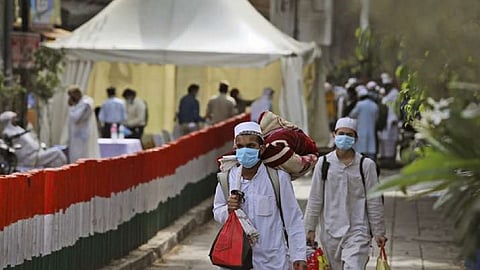

The Bombay High Court Monday quashed criminal charges against eight Tablighi Jamaat members hailing from Myanmar accused of spreading the Covid-19 infection.
A division bench of Justices V. M. Deshpande and Amit B. Borkar at Nagpur held that there was no material on record to prove that the accused had indulged in any act, which was likely to spread the infection.
The bench held that the implication of the accused persons would be an abuse of process of law. It added compelling the applicants/accused to undergo the trial would cause grave injustice.
The Court was ruling on a plea filed by the Myanmar nationals seeking to quash the FIRs and charge-sheets filed for offences under Section 14(the penalty for violation of Visa conditions) of the Foreigners Act, Section 3(Penalty. Any person disobeying any regulation or order made under this Act shall be deemed to have committed an offence punishable under section 188 of the Indian Penal Code) of the Epidemic Disease Act, 1987 and Section 51 (Punishment for obstruction, etc.) of the Disaster Management Act, 2005.
The accused were also chargesheeted for offences under Sections 188 (Disobedience to order duly promulgated by public servant) 269 (Negligent act likely to spread infection of disease dangerous to life) and 270 (Malignant act likely to spread infection of disease dangerous to life) of the Indian Penal Code.
The Court held that there was no material produced by the prosecution to prove that the accused were engaged in Tabligh work and they were involved in preaching religious ideology or making speeches in religious places.
On the contrary, the Court said, from the statements of the witnesses mentioned in the charge-sheet, it was clear that the applicants were not conversant with the local language and they studied the Quran and Hadis in their language.
"From the material produced in the charge-sheet, except the statement of the witnesses referred in the chargesheet, there is no other material produced by the prosecution to prove the ingredients of contravention of Section 14 of the Foreigners Act", the Court held.
On the allegations that the accused spread Covid-19 infection, the Court said to attract Sections 269 and 270 of the IPC, the person must commit any act which he knows is likely to spread infection of any disease which is dangerous to life. The Court took note of the fact that the accused had undergone Covid-19 tests during their period of quarantine i.e. from April 3 and their test report for infection of Covid-19 had been negative.
It further observed that it was not disputed that they were kept in isolation from March 24 till March 31 under the supervision of Dr Khawaj, NMC Zonal Officer, Mominpura, Nagpur.
"There is no material on record to prove that applicants had indulged in any act which was likely to spread infection of COVID -19", the bench said.
In so far as charges under Section 51 of the Disaster Management Act, 2005 and Section 3 of the Epidemic Disease Act, 1897 were concerned the Court said that there was no complaint in writing by the public servant concerned or by some other public servant to whom he was administratively subordinate. Therefore, in view of the bar under Section 195(1)(a) of the Code, the Magistrate ought not to have taken cognizance of the offence punishable under Section 188 Indian Penal Code on the report submitted by the Sub-Inspector of Police.
In so far as an offence under Section 51 of the Disaster Management Act,2005 is concerned, the Court said that the material on record did not indicate that the applicants had failed to comply with the direction issued under said act.
The accused had arrived in India on March 3 on a tourist visa. The Government of India called for a Janta Curfew on March 22. At 06.30 am on March 22, the applicants were shifted to the Markaz Center at Mominpura, Nagpur within the jurisdiction of Police Station, Tahsil and the information to that effect was provided to the Police Station but, the acknowledgement was not obtained due to the Janta Curfew.
During their stay from March 23 till March 31, Dr Kkhawaja, NMC Zonal Officer, Mominpura along with his team and Police had visited the applicants/accused. On April 3, at about 03.30 p.m. all the applicants/accused were sent to institutional quarantine at the M.L.A. Hostel, Civil Lines, Nagpur and they had all undergone a test for Covid-19, which was negative.
Eariler, the Bombay High Court's Aurangabad bench had quashed FIRs against as many as 29 Tablighi foreigners who were booked by the Maharashtra Police for allegedly spreading Islam in breach of their tourist visa condition and also for attending a congregation in Markaz Nizamuddin, Delhi in violation of prevailing lockdown orders.
The High Court had also slammed the media for holding Tablighi foreigners responsible for the spread of Covid-19 in India.
"There was big propaganda in print media and electronic media against the foreigners who had come to Markaz Delhi and an attempt was made to create a picture that these foreigners were responsible for spreading COVID-19 virus in India. There was virtually persecution against these foreigners", the High Court had said.
http://theleaflet.in/wp-content/uploads/2020/09/Bombay-High-Court_Nagpur-Bench_Quashing-of-FIR.pdf